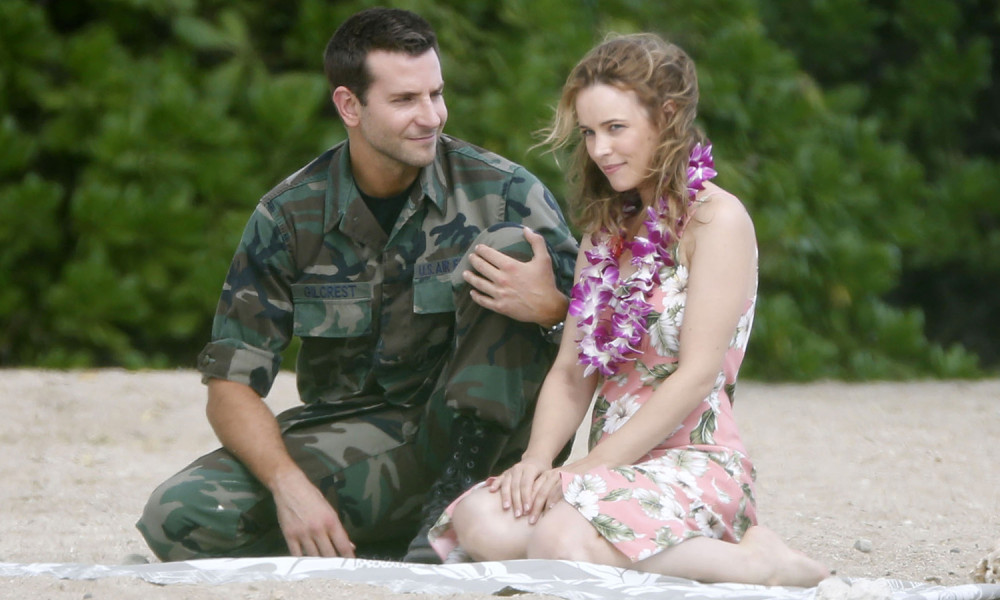Native Hawaiians Criticize Aloha as Another Example of Hawaii Being “The Verdant Background for White Fantasies”

Just some white folks enjoying Hawaii–you know, like in EVERY MOVIE EVER EXCEPT, LIKE, LILO AND STITCH.
People who are not Native Hawaiian are used to hearing and saying words like “aloha” without even thinking about it. It’s just Hawaiian for hello and goodbye, right? Wrong. As the studio behind the upcoming Bradley Cooper/Rachel McAdams/Emma Stone vehicle, Aloha, is starting to find out, cultural context is extremely important, and cultural appropriation is not cool.
Aloha, directed by Cameron Crowe, is a military romantic comedy (like Top Gun?) in which, according to the official description:
While revisiting the site of his greatest career triumph, a military contractor (Bradley Cooper) unexpectedly falls for the hard-nosed Air Force watchdog (Emma Stone) assigned to him while simultaneously reconnecting with his ex (Rachel McAdams).
Meanwhile, the fact that the word “aloha” is being used as the title of a film having anything to do with the military is what gives some people trouble. As reported by The Hollywood Reporter:
“If you have a romantic comedy about the military in Hawaii … but a title that says Aloha, I can only guess that they’ll bastardize the word,” said Walter Ritte, a Native Hawaiian activist on the island of Molokai. “They’re taking our sacred word … and they’re going to make a lot of money off of it.”
So, what does “aloha” actually mean? MSNBC host and Native Hawaiian, Janet Mock, explained on her show, So Popular!:
Aloha actually comes from two Hawaiian words: ‘alo’ — which means the front of a person, the part of our bodies that we share and take in people. And ‘ha,’ which is our breath. When we are in each other’s presence with the front of our bodies, we are exchanging the breath of life.
Back when the film was shooting in 2013, it didn’t have a title. Had Hawaii State Film Commissioner, Donne Dawson, known that that’s what the title was going to be, she would’ve counseled them against it:
The office must also balance those duties with protecting resources and communities, said Dawson, who is Native Hawaiian.
“We’ve had a century of misrepresentation, of misunderstanding, of miscommunication of who we are,” she said of Hawaii’s role in the movies that dates to 1913. “We have fallen prey to the stereotypical ideas … that people have about Hawaii. It’s not based in truth and it’s not authentic.”
The title alone would not have been a basis for denying permits. “It’s not my job to basically tell people what they can do with regard to the creative,” Dawson said. “I can tell them what to do and not do when it comes to filming on public land.”
However, as with everything else, not all people in this group feel the same way about it. (Spoiler Alert: No group is a monolith!):
Hawaii residents, including Native Hawaiians, worked behind and in front of the camera on the movie, said Brenda Ching, executive director of the Hawaii local of the Screen Actors Guild-American Federation of Television and Radio Artists.
The title doesn’t bother all Native Hawaiians.
“If you look at what aloha means, how can it be bad no matter how it’s used?” said TV and radio personality Kimo Kahoano. “I think Hawaii is the best place in the world. And the reason is aloha.”
While not all Native Hawaiians feel the same way about the title, or the film, I think this is another opportunity for filmmakers to stop and think about the kinds of films they want to make, and the kinds of filmmakers they want to be. It’s very easy to fall back on certain tropes, stereotypes, and images with which people are familiar. However, filmmakers also have the chance to give people voices and represent them accurately and thoughtfully. Regardless of how this particular film has turned out, I hope that Cameron Crowe and filmmakers like him will stop and think things like Next time I make a film set in Hawaii, maybe I should make it about a Native Hawaiian and do more than superficial research into the culture of my setting next time they create a project.
In the meantime, here’s an image of a story set in Hawaii about a Native Hawaiian who’s just adorable:
—Please make note of The Mary Sue’s general comment policy.—
Do you follow The Mary Sue on Twitter, Facebook, Tumblr, Pinterest, & Google +?
Have a tip we should know? tips@themarysue.com